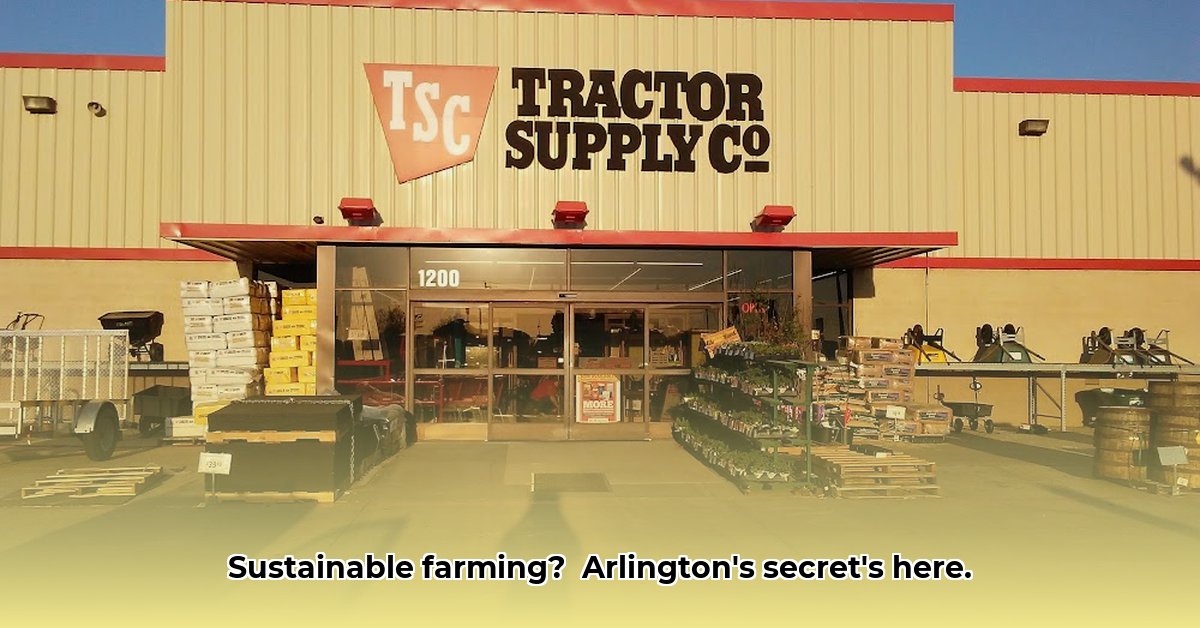
Tractor Supply Arlington TX: A Growing Role in Sustainable Agriculture
Tractor Supply Company (TSC), a ubiquitous presence in rural America, is increasingly intertwined with the burgeoning movement towards sustainable agricultural practices. While not explicitly branded as a champion of eco-friendly farming, TSC’s extensive product catalog and widespread accessibility offer a significant, albeit often overlooked, pathway for farmers to adopt more sustainable methods. This article examines TSC's current contributions, the challenges it faces, and actionable steps it can take to further its role in fostering a greener agricultural future.
Imagine Sarah Miller, a small-scale organic farmer in Arlington, Texas. For her, TSC isn't just a retailer; it's a vital source of organic chicken feed, a product she struggles to find elsewhere. This accessibility is crucial to her operation, highlighting TSC's implicit role in supporting sustainable practices even without overt marketing in that direction. However, Sarah also notes a lack of clear labeling for sustainable products, a gap that points to a larger opportunity for TSC. Her experience reflects a larger narrative: TSC possesses significant potential, but realizing it requires a more proactive strategy. For more on TSC locations, check out this nearby Tractor Supply.
TSC's Current Involvement: A Mixed Bag
TSC currently offers various products applicable to sustainable agriculture, including organic seeds, water-saving drip irrigation systems (available online and in-store, but often not prominently featured as such), and compost bins. However, the company's marketing strategies often fail to explicitly highlight these items’ environmental benefits. This lack of clear labeling and promotional emphasis represents a missed opportunity to actively engage farmers interested in sustainable practices. The store's current approach is reactive rather than proactive, reflecting a need for a more deliberate commitment. Wouldn't clearer signage and targeted educational campaigns empower more farmers to make eco-conscious choices?
The Broader Context: Sustainable Agriculture and TSC's Position
The demand for sustainably produced food is rapidly increasing, creating a significant market opportunity for businesses aligning with consumer values. TSC, with its established customer base and widespread reach, is uniquely positioned to capitalize on this trend. Its vast network of stores could become hubs for disseminating information and promoting environmentally conscious practices. Yet, TSC faces significant competition from other agricultural suppliers already aggressively pursuing the sustainable agriculture market. The key to success lies in proactive engagement and a visible commitment to environmental responsibility.
Actionable Steps for a Greener TSC
To truly establish itself as a leader in sustainable agriculture, TSC must adopt a multi-pronged approach:
Enhanced Transparency: Publicly disclosing its sourcing practices and supply chain details will significantly bolster customer trust. Detailed information about product origins and production methods would showcase TSC's commitment to environmental sustainability. This increased transparency would resonate deeply with environmentally conscious consumers.
Strategic Partnerships: Collaborating with local sustainable agriculture organizations, such as environmental nonprofits and university extension programs, will provide valuable expertise and resources. These partnerships could improve product selection and generate educational materials for farmers.
Educational Initiatives: Hosting workshops and online educational resources on sustainable farming techniques would empower farmers with the knowledge and skills to adopt these practices. Covering topics such as water conservation, soil health, and integrated pest management would be particularly beneficial.
Expanding Sustainable Product Lines: Expanding its product range to include a wider selection of certified organic products, water-efficient irrigation systems, and other sustainable farming tools would meet the growing consumer demand for eco-friendly options. This expansion would also diversify TSC's supply chain and strengthen its position in the evolving market.
These four steps represent a strategic shift towards proactive engagement with the growing demand for sustainable agricultural solutions. The potential benefits—enhanced brand reputation, increased sales, and a positive environmental impact—far outweigh the costs involved.
Conclusion: Embracing a Greener Future
Tractor Supply's potential to significantly impact sustainable agriculture in Arlington, Texas, and beyond, is substantial. By actively embracing transparency, building strategic partnerships, investing in farmer education, and expanding its offerings of sustainable products, TSC can transform itself into a true champion of environmentally conscious farming. The question for Tractor Supply isn't if it can play this crucial role, but rather when it will fully embrace the opportunity.